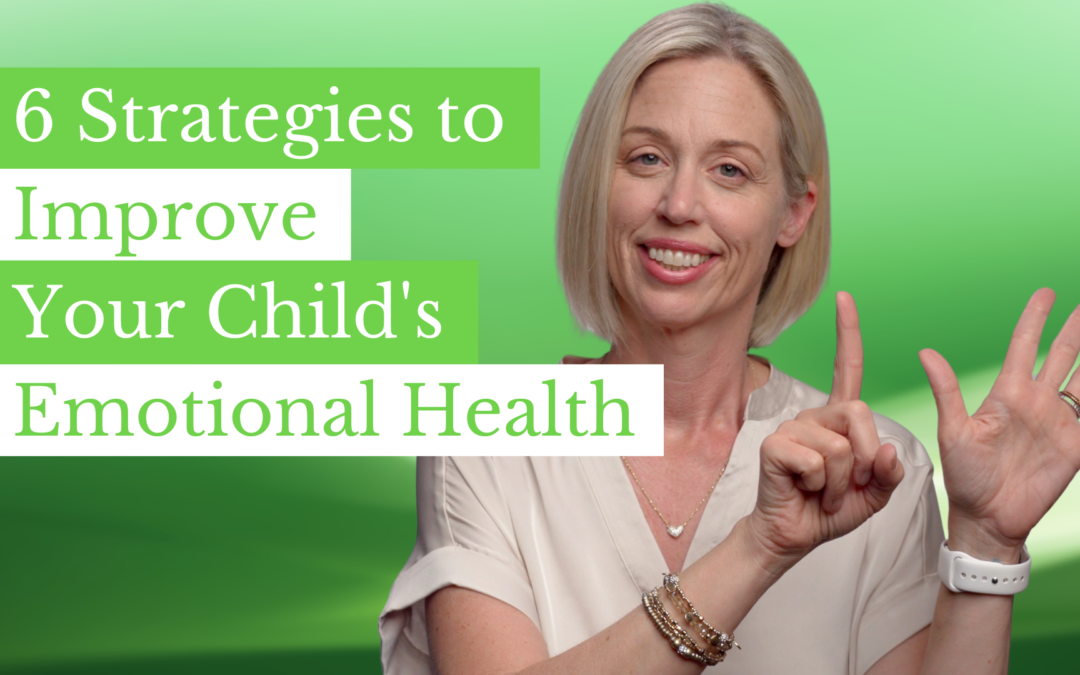Raising a child is a rewarding yet challenging journey. It’s natural to want your child to thrive, and a crucial part of that is their emotional well-being.
Just like physical health, emotional health needs nurturing and support.
Hi, I’m Lauren Clancy, a Child and Teen Therapist at Kid Matters Counseling, and in this article, I’ll share some strategies you can implement to help your child flourish emotionally.
1. Foster Open Communication
Create a safe space where your child feels comfortable expressing their feelings, worries, and experiences. Ask open-ended questions that encourage them to elaborate on their thoughts and feelings.
Questions like, “What was your favorite part of today?” or let’s say there was a bullying situation on the playground. You could ask, “How did you feel when you saw that boy being bullied?”
2. Validate Their Emotions
Let your child know that all emotions are valid. It’s okay to feel sad, angry, frustrated, or scared. Help them identify their emotions by using words like “happy,” “frustrated,” or “anxious.”
Avoid minimizing their feelings with phrases like “don’t worry” or “it’s not a big deal.“
3. Build Emotional Intelligence
Emotional intelligence is the ability to understand and manage your own emotions, as well as recognize and respond to the emotions of others.
Play games that involve identifying emotions in facial expressions. Read books together that explore different feelings.
Encourage your child to describe how they think a character might be feeling in a story. You could ask, “If you could have any superpower, what would it be and how would you use it to help others?“
4. Include Quality Time
In our busy world, it’s easy to let quality time with your child fall by the wayside. Make a conscious effort to schedule regular one-on-one time with your child, free from distractions.
This could involve playing a game, reading together, or simply going on a walk with them. Just the two of you.
5. Set Clear Expectations and Boundaries
Having consistent expectations and boundaries provides a sense of security for children. If you believe your child is spending too much time looking at a screen, you could say, “At 6:00pm all screens are turned off and it’s time to play a game.”
Explain the rules clearly and enforce them consistently, but be willing to adapt as your child matures.
7. Promote a Healthy Lifestyle
Adequate sleep, a balanced diet, and regular physical activity all contribute to a child’s emotional well-being. Ensure your child gets enough rest, eats nutritious meals, and has opportunities to be physically active.
In a pinch, I keep some granola bars in the pantry for when my child needs a quick snack to help regulate their bodies so they don’t get hangry.
Bonus Tip: Seek Professional Help
Don’t be afraid to seek professional help if you’re concerned about your child’s emotional health. A therapist can provide valuable guidance and support for both you and your child.
If you’re looking for additional support in helping your child reach their full emotional potential, don’t hesitate to schedule an appointment at Kid Matters Counseling today.
We’re here to help your child on their journey to emotional wellness.

Lauren Clancy
Child Therapist
I have been helping kiddos overcome obstacles and build the emotional tools they need to navigate life’s ups and downs.
New Clients Call: (855) 586-1802
Current Clients: (855) 543-7687
Ask Us Anything!
We help anxious kids and frustrated parents. We serve Hinsdale & the Western Suburbs of Chicago.
Made with ♥︎ in Hinsdale, Illinois for Chicago
Built By Brand Your Practice.
Kid Matters Counseling, P.C. DISCLAIMER: This website and blog are for informational, educational and general discussion purposes only. It is understood that no guarantee or warranty arises from the information provided, discussed or commented upon in this website and blog nor does it constitute legal or other professional advice on any subject matter. Access to this website and blog is voluntary and at the sole risk of the user. If you think that you have a medical emergency (including clinical), call your doctor or 911 immediately. A licensed medical professional should be consulted for diagnosis and treatment of any and all medical conditions. While the information contained within this website and blog is periodically updated, no guarantee is given that the information provided is correct, complete, and/or up-to-date. See our complete Privacy Policy and Terms of Service.





